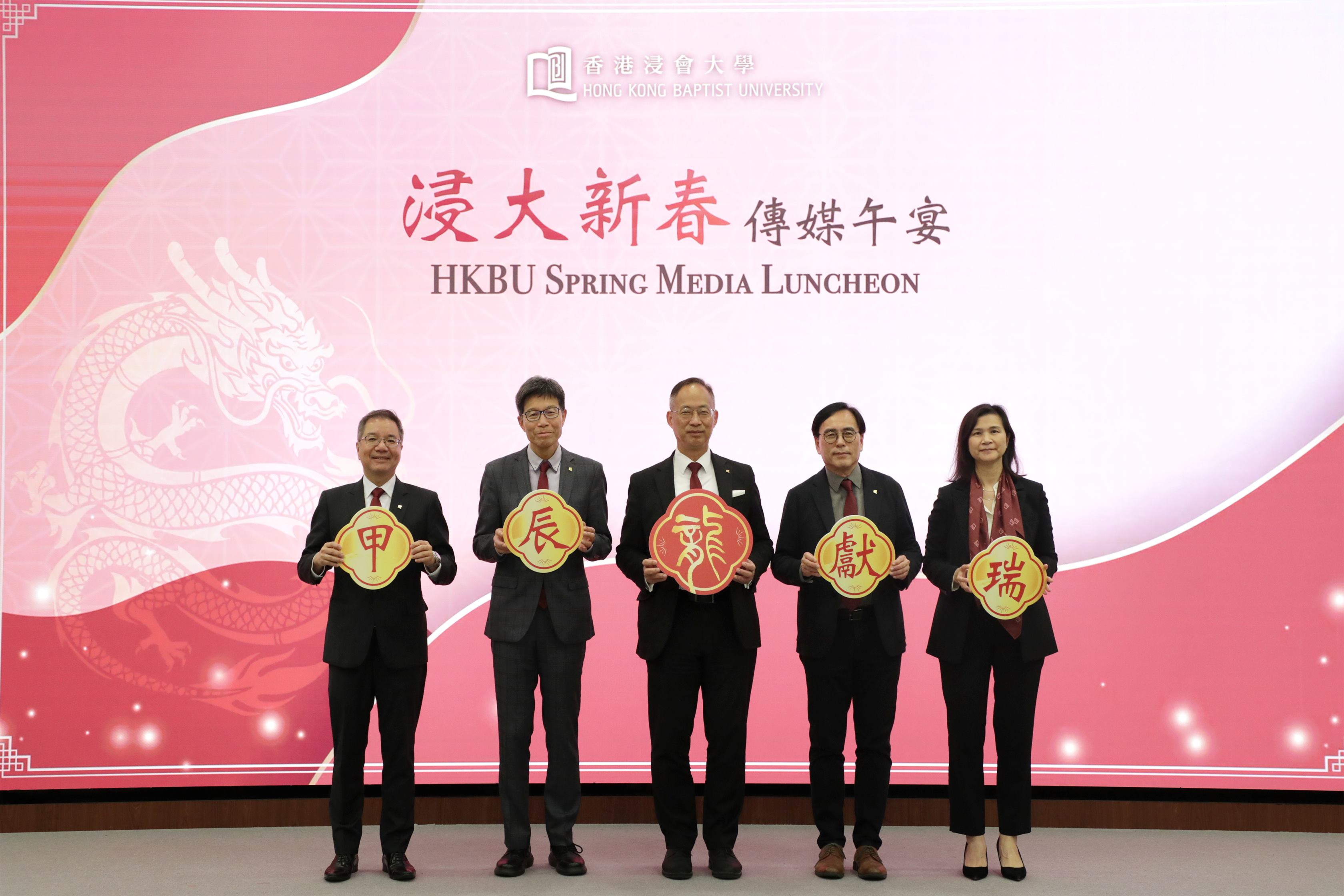Discover HKBU
HKBU shares latest developments at spring media luncheon
29 Feb 2024
On 15 February, HKBU hosted its spring media luncheon, where Professor Alex Wai, President and Vice-Chancellor, along with other senior management team members and faculty representatives, met with media professionals to share the latest developments at HKBU.
Professor Wai highlighted the challenges faced by university education and student development in this rapidly changing era, noting the traditional way of defining the arts and sciences as being outdated. In this light, HKBU has been committed to promoting transdisciplinary teaching and research for the past three years, launching four transdisciplinary undergraduate programmes aimed at nurturing talents with a broad vision, capable of mastering the future and taking up the reins of technology development. To support these programmes, the Division of Transdisciplinary Undergraduate Programmes was also established. Professor Wai said: “We will continue to prioritise and extend our learning and teaching, research, technology translation and knowledge transfer initiatives with the objective of contributing to society and the nation.” Furthermore, HKBU plans to submit the proposal on the consolidation of the Faculty of Arts and the Faculty of Social Sciences to the Council later, with an aim to create a facilitative transdisciplinary and research environment.
Professor Martin Wong, Provost, introduced the latest updates on HKBU’s 10-year Institutional Strategic Plan, with a focus on research excellence. Apart from its existing key research clusters – Creative Media/Practice, Health and Drug Discovery, as well as Data Analytics and Artificial Intelligence (AI) in different applications – HKBU sets focus on the new research cluster of “Humanities and Cultures.” This cluster will encompass a variety of disciplines such as philosophy, literature, social work, sociology, geography, history, political science, learning sciences and human development, communication and economics, with the aim of further promoting transdisciplinary collaboration and research. It will address critical issues including “East-meets-West” cultural exchange, future societies and economies, and human-nature relationship. This initiative also aligns with the HKSAR Government’s strategic positioning of Hong Kong as an East-meets-West Centre for International Cultural Exchange.
Dr Albert Chau, Vice-President (Teaching and Learning) and Acting Dean of Arts, shared the latest developments in enhancing students’ learning experience. In partnership with Beijing Normal University-Hong Kong Baptist University United International College in Zhuhai, HKBU launched the “Extended Study Programme in Greater Bay Area” in 2023 according to the novel concept of “One University, Two Campuses”. This initiative allows students from Hong Kong and Zhuhai to study at the other campus for a semester or a year, with credits mutually transferable. The programme facilitates exchanges through different learning and internship activities, and the experience of cultures of the two places. International exchange students at HKBU can also visit the Zhuhai campus to experience the culture of the Greater Bay Area, and joint activities such as visiting high-tech zones, thereby realising the promise of “One Exchange, Two Experiences”. The programme has attracted the participation of 180 exchange students from 40 countries.
Ms Christine Chow, Vice-President (Administration) and Secretary, highlighted a major campus infrastructure project – the Jockey Club Campus of Creativity. Spanning approximately 7,500 square metres, the campus will feature residential colleges, learning and teaching as well as co-creation spaces. The Village CARE, comprising four residential colleges, will provide over 1,700 hostel places and is expected to be operational this year. It aims to integrate living and learning spaces seamlessly, fostering transdisciplinary research and exchange. The campus will also house the “Jockey Club Creative Hub”, featuring Asia’s first “White Box Experimental Space,” a large music scoring studio, a post-production cinema, and other advanced facilities, supporting learning and teaching as well as research in creative disciplines. Additionally, HKBU is the service deed contractor for Hong Kong’s first Chinese medicine hospital scheduled to commence service in phases in 2025. It will become a flagship in clinical service, teaching and training, scientific research, and the creation of value for health.
Apart from learning and teaching, HKBU is also actively expanding its work on innovation, technology translation and knowledge transfer. Professor Terence Lau, Interim Chief Innovation Officer, shared HKBU’s strategic collaborations with the industry to foster the modernisation of Chinese medicine, promote collaboration between Chinese and Western medicines, and innovate in biotechnology. The University is fostering cross-area research and applying AI in different areas of technological innovations. The establishment of the Art Tech Incubation Hub and e-Fund further aims to boost innovation and entrepreneurial development. Professor Lau also highlighted impactful research outcomes, including the Visualisation Research Centre’s art-tech projects and innovative Chinese medicine approved by the US Food and Drug Administration for clinical trials, showcasing HKBU’s commitment to advancing knowledge and contributing to society.


